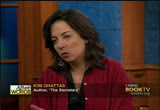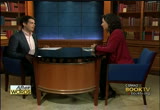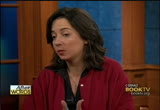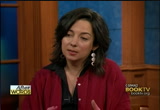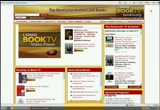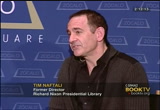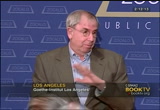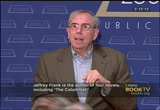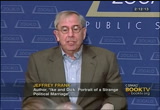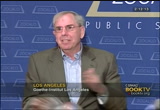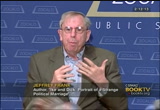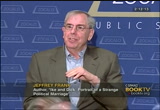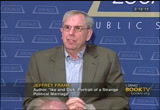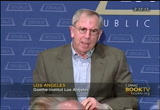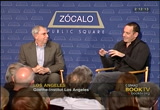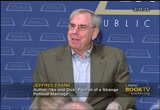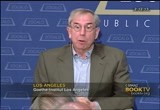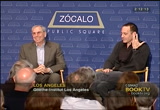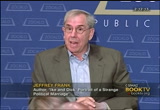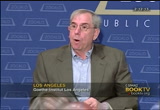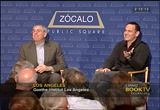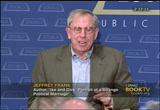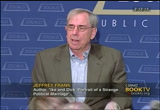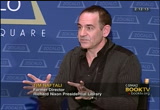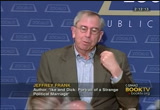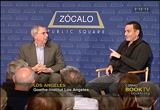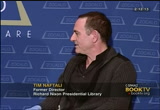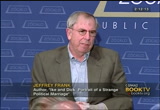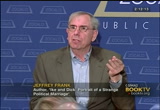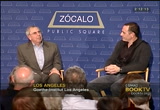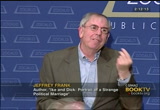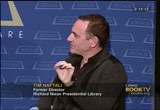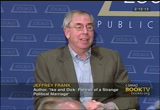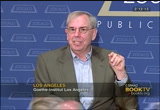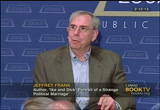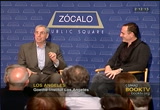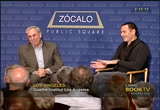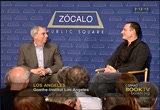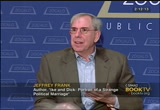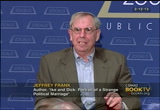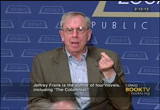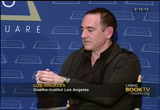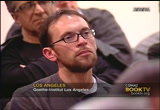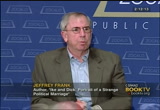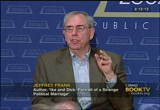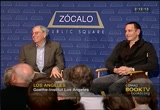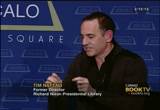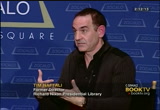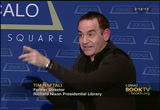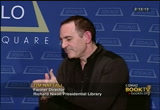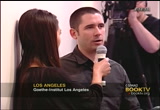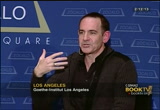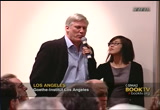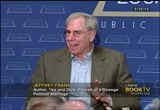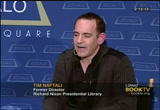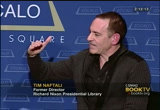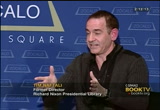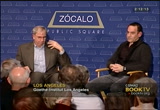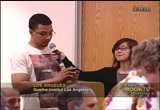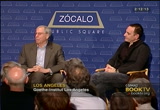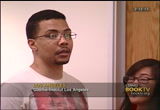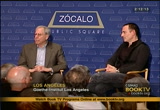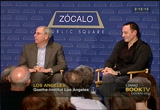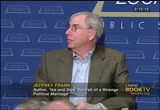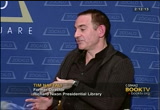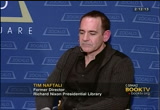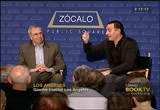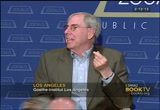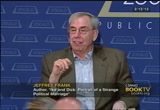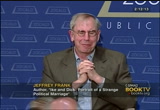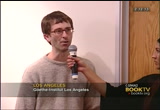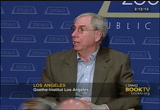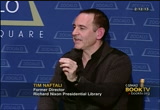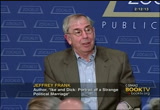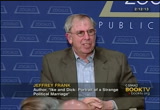tv Book TV CSPAN March 17, 2013 10:00pm-11:15pm EDT
10:00 pm
the other half of the country. otherwise you're not going to move forward. and i've seen officials at the state department and even across washington and, you know, overseas as well sort of roll their eyes and say, oh, you know, women's issues. it's a nice soft power thing to have, but this is not the urgency, this is not the urgent question of the day. and she's made it very much part of the discussion, and she's made people realize, well, if you want to move forward, you cannot leave behind half the population. so -- >> host: i found it, i found it interesting that in one of the cases that you make and they set out in the beginning of the administration is to repair america's image in the world. and while that was in some cases in europe, there's a pew poll from 2008 to 2012 in places i found it somewhat striking, in pakistan and jordan down 7% -- >> guest: even in turkey. >> host: down in turkey, down in beirut, down in egypt. in these parts of the world this is down from the last year of george bush's administration. ..
10:01 pm
10:02 pm
cia and the pentagon and white house and the political debate house to some extent blurred the picture a little bit. i think that in the big picture with information that we have now i don't think it changes her legacy that much better will be used against her if she decides to run for president and she reenters the political light that jury briefly the big picture is that these things, these tragedies unfortunately happened when you're doing diplomacy in these places or a journalist in these places. america lost one of its great embassadors but under president ronald reagan's watch it is the first thing people associate with the name. she was free elective accept of course for the relatives of those who died in beirut to it's
10:03 pm
hard to say how it will affect her legacy that it continues to be associated with her time in office. >> host: thank you for the book and for the interview. >> guest: thank you for having me. was a pleasure. >> got was "after words," booktv signature program which authors of the latest nonfiction books are interviewed by journalists, public policy makers, legislators and others familiar with the material. "after words" airs every weekend on booktv 10 p.m. on saturday, 12 and 9 p.m. on sunday and 12 a.m. on monday. you can also watch "after words" on line. good booktv.org and click on "after words" in the book tv series and topics list on the upper right side of the page.
10:04 pm
jeffrey frank recounts the personal and working relationship between president dwight eisenhower and vice president richard nixon. mr. frank reports nixon constantly sought eisenhower's approval while eisenhower was unsure of mix and's ability to assume the presidency. it's about one hour and ten minutes. [applause] >> welcome to all of you. it's my pleasure to introduce jeff frank. jeff frank is an accomplished writer. those of you that by the book today will be blessed in reading the pros. jeff spent 13 years of the washington post. i'm not sure that's where he learned how to write well but we get a good story and by the end he was in the outlook section
10:05 pm
and then he went to the new yorker and was a senior editor there for nearly 13 years and that is a place where you learn to write well and help others write well. besides writing nonfiction jeff has written three or 4i guess works of fiction so this is someone who understands the importance of narrative of a good story and he brought those talents for some reason to the relationship between eisenhower and nixon, and i want to begin by asking you, jeff, why did you choose that particular marriage to be the focus of this? >> because it really was a great story. here it began with two people who really didn't know each other. one was an american hero. we don't have a five-star general, no more five-star general is given credit for leading the allies to victory in europe, and a 39-year-old orange county congressman who was --
10:06 pm
eisenhower ran with nixon but he didn't choose him as vice president. he wasn't aware, he later was asked by "the new york times" what happened the night nixon was chosen there were six or seven people on the list and nixon was on the list and so they got together and they have a very strange relationship that went on and on during eisenhower's presidency it became closer when nixon calls eisenhower's christa residency and then around 66, eisenhower's dramas on the comedy hit, began to date julie nixon who was going 7 miles away, and they completely were crazy about each other. a year later when they were 20, they were married. and they became one family in
10:07 pm
november of 1968 they had thanksgiving together, nixon and eisenhower, and the first board was an eisenhower and it is a great story from beginning to end. >> the topic of tonight's discussion is rethinking nixon. is this experience of writing about this relationship cause you to rethink? >> i'm not sure that i really would have. if i was in the during the nixon presidency i have an epilogue that deals with what came after. it began and two months later eisenhower was dead and that sort of covers the story from the first meeting they met at the bohemian grove at the men's club in san francisco. >> what sense of the man did you get? >> she baffled me and i found
10:08 pm
him extremely complicated. i was riveted by the different sides of him. he could be really vindictive and his vicious long before the takes be heard. at one time he referred to the 1960 running mate as a bottomless wonder and that sort of thing yet he could be so kind to people. and so generous in ways he didn't have to be paid he always had a thing about the kennedys but when he was president she invited mrs. kennedy and her children to see then a white house and it wasn't a all the perfunctory look around. they played with the dog and they wrote thank you letters and personal letters hand written backed to the children. they were so touched she yelled back to next-gen and they had that side of him and then they had this other side they just completely baffled me. >> what struck me in reading the
10:09 pm
book is coming dwight eisenhower was to richard nixon. it's amazing. >> i think a lot of that he wasn't even aware of it and he regarded everyone that worked for him as a staff and nixon was a lieutenant commander of the navy, and there again, eisenhower was a five-star general. i tried to get a sense of that today. we have four stars like david petraeus as the difference between huizenga the allied expeditionary forces in normandy or iraq as a magnitude jimmy roosevelt fdr's son wanted to run as a democrat. he could run with both parties and have different vice presidents with him.
10:10 pm
it is delivered and start off in a very bad way. i sure that you all know the story of the crisis which began with a story that nixon supported by a group of millionaires, a secretive group of millionaires and there was a lot of pressure to get him off the ticket and eisenhower wanted him off the ticket and long story short, mix and went on television and explained to himself and reveal all his finances and talked about the dog checker's he wasn't going to give back and defied eisenhower's orders to resign. he said right to the national public committee basically circumventing eisenhower's right to remove him from the ticket, but from that moment on, things were never the same even though they did become closer and the work together.
10:11 pm
eisenhower, nixon later wrote he was a scar that never healed, and julie nixon in her book about her mother said that every september 23rd was the anniversary of the speech. her father would say to you know what day this is? this is the anniversary of the speech and he never forgot. and so, again, there were many episodes to try to get him off the table in 56. she would do things when mix and had a vacation in the summer of 58 key was with his family and they were often messaging i want you to come back to washington. so there was just never anything. he was never a kind boss and he wanted his own way. it was just sort of casual indifference to the future of other people. >> we are seeing tonight for some reason all of you decided not to watch the state of the union. [laughter]
10:12 pm
but somebody in the country, some people are watching the state of the union, and we are watching an alloy of course a dialogue between a research and free elected president and a divided party. you wrote about quite a different republican party. >> it was a different party. the party was totally different when nixon and eisenhower it was a civil rights party of lincoln and the the democrats -- >> jackie robinson. >> and martin luther king was a big supporter until they had a bad moment when nixon didn't come to his aid. nixon was working in the senate and lobbied for a stronger version of the 1967 bill that was a landmark bill at the time,
10:13 pm
so they were very different parties and the leaders of the party there was a liberal and conservative wing so to speak, the conservative wing, people like robert taft, he was an isolationist but he supported the pensions. he had a real social conscience and so on. there were out fliers to the trustees six out fliers in the country and there was senator mccarthy but they were out fliers to be dated and speak with authority, and in fact even though eisenhower was reluctant to take anybody on directly, she felt he did want to get mccarthy from the party that put next-gen up to it. >> one of the challenges for someone writing about richard nixon i think, i would like to know if you share this view, that we have an ocean of information about him as president largely because he decided to leave it for himself. he didn't expect the public to
10:14 pm
have access to it and we don't have as much about him as vice president. and how -- laws your hard was it to get to next and when you wrote about him in the 50's? >> i get a lot of credit to timothy who was the director of the nixon library. a lot of stuff was open and you can go down there and go through this coming you can go to the archives and find the more time you spend, the more things you would discover. i began to get fascinated by the notes that mix and wrote on the yellow pad he would write down almost -- ki was like an a student. everything he did and saw he would take notes. eisenhower did him a big favor in the fall all throughout asia and in vietnam he met the emperor and they basically said he saw the future in a way he didn't like it, but you can see
10:15 pm
nixon reflecting and being resentful and when he saw that eisenhower was trying to get rid of him in 1956 he was writing down things. it's the president's choice, for the good of the party to the issue is basically writing his own sort of speech. he never said it but you could find all these things and it's all there and you've got to keep looking. the other thing that is important, and tama could talk about this, there is a barrier between the nixon library which is run by the national archives, and the foundation that is a far more celebratory, and i had to work with them too. they were terrific. they decided they were going to trust me to be fair. and i hope i was fair. they put me in touch with one person in particular i was talking earlier about the assistant to rose mary woods, nixon's secretary in the congress, and he was basically with him for all that time, too working when the crisis that we
10:16 pm
spoke about continues and nixon was under great pressure on a train going from northern california to oregon, and he was there and can talk about what was like to meet general eisenhower's a that was from the side labor really good they're all open and they were professional artists when the high standard was met. i couldn't remember if i was 28 or nine trips to yorba linda and i saw enough of the olive garden [laughter] >> in other words, they were. >> there is a very good sandwich shop. >> it's a 50 minute walk. >> first learned of richard nixon's career, historians are problematic and you did a very,
10:17 pm
very good job of navigating and talking to everyone. i noticed in the look you interviewed a number of folks who would have been interviewed by the library in the first year or two but after awhile they decided they didn't really want to talk to us but that's important. i would have to say that standing back, the darker side of richard nixon that we know from the tapes do you see hints of that in the 50's or are you among those the believe that there was a change that this man actually been traumatized? >> i thought about that a lot and i am one of those the believes there was a change coming and i don't know what it dates from but i think it probably dates further commit probably dates from the beginning of the relationship with eisenhower. i think that he was under constant strain and like any employee he hired by a sort of top level corporation we didn't
10:18 pm
know whether his job was safe in the election when xm realized the tenure there was nothing to be done except he needed the support if he was going to be running for president and after his heart attack in 1955 which we can talk about or not, but its the first time people began to talk about nixon as an heir to the presidency. this was unusual. they were not the heirs of the presidency. no one thought of john gardner or harry truman. roosevelt didn't think of him as the mayor of the presidency. he didn't tell him anything. >> he didn't have an office in the white house. >> they didn't of great favor to keep them informed to he been in cabinet meetings. he ran their and the same thing with the national security council. eisenhower sent all three raised
10:19 pm
in 1957 after nixon became close to john foster dulles after eisenhower's heart attack and he suggested that nixon should visit when the gold coast got its independence. so that's what eisenhower did to try to get mix enough to speed. ki said they don't want someone that is just going to bang a gavel in the senate. >> so there are people who argue that there's the experience of losing such a close election to john f. kennedy in 1960 that the was the trauma. you are laying the foundation for an argument -- no camano. >> he was a father figure and he couldn't please his father figure. >> i'm not going to go into the psychoanalysis. >> everyone else was starting with it. >> i don't think richard nixon appointed himself in the bathroom. >> no, no.
10:20 pm
it's a wonderful line we thought he was under the influence of cheney but he was under freud i think the 1960 election was dramatic all kind of levels. one, nixon was always regarded kennedy as a friend. he liked kennedy. one of the things i found after nixon's campaign bus but douglas -- campaign with the douglas he spoke with some kids at harvard and said i am really glad that mrs. douglas lost. but mix and supported kanaby's membership application to the burning tree country club and jack and jackie invited them to the wedding when jack kennedy was laid up with a back injury nixon helped in the senate and protected him and mrs. kennedy
10:21 pm
wrote to him and said you are one of the most wonderful people. i won't call them friends, they were politicians. no one is really friends in this business. >> o'neill and ronald reagan must have been friends. >> yeah right. [laughter] there were colleagues and roughly the same age. nothing was held back. she felt she was being roughed up and they were saying terrible things about him. there was a left leaning campaign for the more he thought when it was all over that he had been stolen, she thought that he won. if he had one illinois, and he always felt that he got stiffed in that election. >> there was an interest in ethnic sam and i caught some of
10:22 pm
this when i was at the library because of george w. bush, because people were looking back to nixon saying you can have a good government republic that once the government of the efficient. although under mix and it did grow. the the republican party is so different now because there is no room for nixon so there was much more interesting richard nixon's domestic agenda. everybody is interested obviously in the foreign policy side like the end of the war in vietnam. but i noticed this in the second term of the bush administration there was more interest in the domestic policy. it is a real problem for historians because of the tapes richard nixon is not always very happy about his domestic policy. i was wondering since we are looking at the earlier period for next-gen, where would you
10:23 pm
put him in the new deal in the 1950's? would you say he is interested in a continuation of the new deal? what role does he see the government playing in the society? >> certainly think he had no desire to undo the new deal. she was very much aware and in favor of a catastrophic health plan. don't forget when nixon was growing up his family was poor, but he had two brothers who died of tuberculosis so there wasn't very good health care. one brother was 7-years-old, six or seven and then his older brother died when he was 25 and so she was -- so he was very much an internationalist and nixon was a big supporter of the marshall plan and voted for it and a lot of his sestak even if he didn't love them he certainly supported the environmental protection agency began under nixon and he brought in pat
10:24 pm
moynihan to even promote this idea of the income tax and so one and even though nixon backed away from it, it was a certain standard set about the welfare system in the country that you have to give maximum credit for. the philadelphia hiring plan and others so she was a pretty good domestic president. i talked to a guy named paul musgrave who said in the first three or four months of the presidency it was like a golden age if you go back and look at it again it's amazing. all the stuff is going on, new policies and ideas, and the public pieces, john osborn wrote for the watch and said the domestic policy meetings they sit around for hours laughing it and there on a whole different side of mixing. then it all stopped. he stopped. he lost interest. >> that is what makes him such a puzzle. >> i'm not suggesting that you are doing this but i was
10:25 pm
watching on c-span some clips from nixon's state of the union address. again, i am not suggesting this is a way of becoming healthy, but i did it. and i noticed him talking again and again about the environment. and how proud she was of his achievement in cleaning up the aerts and of the water. he said it and he was proud of it publicly, and yet on the tapes you have him grousing about it not once or twice, but constantly, identify and environmentalism with liberals saying that we have made a mistake. we shouldn't do this. and if i ever have a choice between jobs and the environment, i always go with jobs. don't ever forget it and fire people that say they should go for the environment. it is so hard to understand. on the one side but he said publicly in the state of the
10:26 pm
union address, not once but three times that i listened to, what you would want and you actually expect bill clinton it's not president obama to say. but privately he is grousing. do you see in the 50's a man that is at war with himself over what he believes? >> i can see that. one of the most interesting things following this thread of mixing and civil rights, i mentioned the trip to africa and 67, and that's where we met martin luther king, dr. martin luther king who was 28-years-old at the time and nixon they've really got along. particularly trying to see nixon to lobby for the administration you wanted to get to eisenhower. they said sure, come and see me. they met in washington at the office and they stayed in touch regularly. and king really felt they had a correspondence he was really
10:27 pm
admired pity and he had a good sensitivity about this. the one black man and eisenhower's white house salmon named fred mauro and he wrote a book called a black book in the white house and he felt completely sort of alienated. people he felt prejudice but he felt -- he said fred i don't think you should always be talking about job issues that affect black people. i think that you should -- he really appreciated this sensitivity. was baffling. he baffles me in so many ways. but nixon is always pretty good. i can't forgive or ex plan from some of the leader takes but the job is terrible. it's horrible. and they have so much pressure on them and harry truman, for example, we know now accused the n word regularly but there were
10:28 pm
no tapes come he would say good old harry truman. harry truman didn't sound so great and you forget them but it's what they do, what they do that counts. some of the grousing that he does about the liberals that always want more. distressing about liberals. >> the challenge is venting also again it's the president of the united states after all and the president said to tell. but it is acting on some of the venting. it's actually acting on this which is i think when you draw the line between the two. >> for me acting on the anger is vietnam and they were getting into the end to the self destruction of this presidency
10:29 pm
which isn't my subject fortunately. >> let me ask you were the seeds -- if he had been elected in 1960 -- historians say they don't like factor walls. we love them. [laughter] dinner is conversational. many become if he had been elected in 1960, -- >> who knows, what we have had a viet nam war? >> that would not have happened. >> but it was probably the most, i think the most traumatic. we still haven't recovered from it in many ways. tom allen did a review of the book and it's interesting counterfactual sort of digression to say what if eisenhower when he had a stroke in 1957 hadn't recovered, then eisenhower would have been the first to resign and then we would have had mixed and at age 44 what would he have been like? of course we will never know but he wouldn't have been a traumatized beaten up watergate
10:30 pm
president that we got. >> i was going to say i don't think we would have had the cuban missile crisis because i think that nixon who had been supportive of the cuban operation to the extent it was an operation is ambiguously formed before the election of 1960. i don't think that he would have led the bay of pigs go the way it was and i am convinced you to make a strong argument he could have intervened in laos because he had a longstanding interest in indochina. i think the intervention would have started in 1961. actually i can tell you exactly when, when it all collapsed in about march 61. ..
10:31 pm
>> i love counterfactual history. and i think the thing you leave out that is that ike would have been alive and pretty vigorous in 960. eisenhower -- the cuban invasion if it would have gone forward in eisenhower style would have been overwhelming force, and it would have succeeded. eisenhower hated the idea of a ground war in asia. i think he would have said, dick, don't do it, for the same reasons that he managed to keep us out of any real involvement
10:32 pm
in indochina in 1954. eisenhower did send money and probably helped prop up the diem regime, but whether it would have gone much further, i can't imagine. i can't imagine 550,000 american soldiers fighting a gradualist war under anyone except lyndon johnson. >> well, i'll agree with you by then. at that point, yes. 1961, i think, would have played out quite differently. >> fortunately -- >> we have history we have. >> we do. >> you think that the kennedy assassination is a major turning point. >> i think it was the worst thing that ever happened to richard nixon. he had had a really, as we talked about, a really traumatic loss in 1960. he ran for governor in 1962 with the urging of eisenhower among others, a terrible mistake on his part. nixon had a long and detailed memo setting forth the pros and cons, should i run, not run?
10:33 pm
the cons clearly won the argument with nixon, but he could see the temptation. okay, rockefeller's governor of the biggest state, rockefeller was his chief rival in 1960. i could be the governor of the second biggest state. everyone said he couldn't lose, and he lost. he lost in a big way. but in many ways people say it wasn't that big a deal for him. he didn't really care, he didn't really want the job, didn't care about, he didn't really care about the water supply in los angeles. this wasn't his thing. he wanted to think about big world issues. so, and the kids he had taken on -- to his credit, he had taken on the john birch society here, and he had -- and in the primary, he defeated a man named john shell who was a conservative republican who, i think it was the rose bowl hero, he'd beaten him. so his kids, nixon's kids, julie and trisha, were being teased by the children of birchers. they were glad to get out of
10:34 pm
here. they moved to in the spring of '63. nixon got a really job offer, perfect job offer. he didn't have to practice much law. he could give speeches, and he could be a name partner bringing in business at this firm, this wall street firm, it became nixon -- i forget all the names and so on. and things were, they were happy. they were going to musicals, they were eating at the the best restaurants, nixon was having lunch at the club with tom dewey and all these also-rans. they were walking checkers along fifth avenue. trisha and julie were going to the chapin school. in february of '64 -- >> sounds like a frank capra movie. [laughter] in new york, i can just see it. >> peter really liked nixon, new york times reporter who was really impressed by mix son's civil rights -- nixon's civil rights. in february '64, jack parr's daughter randi got tickets for them to see the beatles, and
10:35 pm
suddenly kennedy is killed, and nixon's itch started up again. he wanted to run in '64. he was already meeting with the republican national committee chairman i think the weekend after kennedy was shot. he could feel it coming. and he had told rosco drummond, a big columnist for the tribune, i'm not going to run again in 196, i won't run in '69 or '72. anyone who thinks i'm going to seek public office again is out of his mind. and pat nixon was thrilled to be in new york. life could have been -- he would have been bored, he would have been restless, he would have been an elder statesman with a party, but he would have had a normal, prosperous elder statesman life and then it changed. >> but, you know, he was in dallas. >> he was. >> no, no, no, i'm not suggesting that. [laughter] no, no, just because i'm wearing black doesn't mean i'm going to go into that worm hole.
10:36 pm
>> thank you. >> but he gives a press conference in dallas before the assassination, of course, and he criticizes kennedy's leadership. >> he does. >> now, that's strange for somebody who's enjoying walking his dog in new york. >> oh, he was going to be the big spokesman for the party. he was, he spoke, he spoke in washington, and he was happy to criticize kennedy for the bay of pugs invasion. -- bay of pigs invasion. but it wasn't as if he was running for something. he was a good republican speaking out against the opposition. he was happy doing that. he would meet with eisenhower, they would say, oh -- eisenhower loathed -- no, he didn't. he had contempt for kennedy as truly a young whippersnapper who didn't know what he was doing. >> um, what effect do you think the '60s had on nixon? >> by the '60s, you mean -- >> i mean, after. let's say, let's mark the start of the '60s with the assassination of john f. kennedy. what do you think the effect of vietnam, our mounting
10:37 pm
involvement -- ultimately 550,000 troops -- and then the antiwar demonstrators, what effect do you think that has on his understanding of what it means to be a leader? >> i think, i mean, i think that's, that was the third, that was the other thing that really affected him. he felt under, from the moment he was inaugurated, he felt under siege. he, his inauguration, it never happened before. people were throwing tomatoes and smoke bombs at the car and so on. and then when he's president, the pentagon papers come out. and even though the pentagon papers, the so-called credit history of the war was about the war that lyndon johnson had gotten us into, nixon felt threatened by it. nixon felt it was a breach of security and so on. and so, and certainly the counterculture he was, he had no -- he didn't, he just preponderate didn't get it. it was something alien to him. many some ways it didn't affect
10:38 pm
him. i think the 1968 democratic convention, i think he saw it as a great political opportunity. he used it in advance. he really didn't have much contact with counterculture. his children didn't either. julie and trisha -- david had friends at amherst who were sort of art part of it, and they made funs of him, and julie had friends at myth, but it was not part of their lives. it sort of hit them like a stun gun, you could almost say, when he was president. >> he did a good job on laugh-in though. >> he was coached by a guy named paul keyes who nixon had met when he was on the jack parr program, and keyes was sort of that outlier in that world of comedy. he was a real republican. you could see the outtakes mix son was saying d nixon was saying sock it to me, and nixon ended up with sock it to me. it might have helped him win the election. it was very close. >> now, one of the things that, again, you have this period of
10:39 pm
immense domestic turmoil and foreign turmoil, and it would be natural for a leader to feel besieged, as you said. i'm wondering how much of that he brought with him, and i'm thinking back to, again, the story you lay out so beautifully. he doesn't seem to have a lot of friends in the 1950s. >> no. his friends were, his california friends, the drowns, and i think bob and carol finch were very good friends. even though finch was sort of pushed, when fib. came the -- finch came to work with him, he was sort of pushed out. but he was, um, he was, he was sort of a friendless, lonely man in many ways. and particularly as president. but i think the key to him, the key to his failure as a president were two things. sort of the combination of having great power, enormous power which he'd never had
10:40 pm
before, and you can see him exercise it after he's elected. some of these loony memos addressed to mrs. nixon from the president. [laughter] and it was very, and -- >> loving. >> coming from, he suggested that they should commission a book about the most maligned politician in american history or the great comebacks in history. and where's this coming from? [laughter] and so you can see, and you can see the side that he was sort of this come by nation of great power and great insecurity, and that's a deadly combination. a really deadly combination. and i think that's what finally brought him down. >> something that struck me, one of the things we did at the library was we started an oral history program because the library had been run privately, and the federal government had kept all of president nixon's papers in washington. it was one of the outcomes of watergate. and my job was to bring it together and have a federally-funded and administered library in california with the papers. so we started this oral history
10:41 pm
project 30 years late. i mean, after all, it's much better when you get people when they're just out of the administration in one sense. in another sense, talking to them years later they have time to reflect and may be more candid. the really, really older gentleman that i interviewed for the library had been with richard nixon in the '50s. and you just mentioned something about him pushing them out. without exception, the men that had been with him in the '50s he pushed away from him when he got to the white house. and he brought close to him youngerrer people. he enjoyed having younger people around him. younger people he could mold and shape. and a lot of the trouble that arose was that these younger people were willing to do what he wanted them to do whereas the older people, and the numbers we interviewed, wanted -- kept saying, no, don't do this. now, what i'm wondering is why would he push away the people
10:42 pm
from the eisenhower period who might have been a very healthy and mature influence on him when he becomes president? >> it's worse than that. he would push away people from the early nixon period. i think that was the saddest, the saddest thing. i talked to a man named don hughes, general, air force general. wonderful man who had actually been nixon's military aide and liked mix son, liked him enormously. but we talked about it, and he resigned before the watergate scandal broke loose. he said, you know, things were changing. these orders would come down, why is there no ketchup on the boat? why is this steak overdone? it was clearly, it was clearly from nixon. and he felt this horrible atmosphere, and they all cleared out. and these were people, the only one who sort of stayed finally at the end was roast mary woods of the sort of old nixon hands. there were people who really knew nixon and had been with him for years. don hughes had been with him from the early years of the vice
10:43 pm
presidency, and herb klein who had been his press secretary -- >> he gets pushed away. >> they were just sort of neutered and pushed away. and i think nixon was freer to sort of let loose his worst side. he, ray price, raymond k. price who was the editorial page editor of the herald tribune, he wrote, he was sort of nixon's good speech writer, the good side or the generous side, and pat buchanan who was, who came in who had been, who had worked as a conservative editorial writer in st. louis and was sort of the other side. pat buchanan wrote the speech, probably nixon's most notorious speech, the one that led before the invasion of cambodia, the helpless giants which led to rival campuses, the shootings at kent state. julie and david weren't able to attend their own graduations after that. it was a terrible -- and ray price was the other side. ray price says he has this dark side and the light side. ray price argued that the light
10:44 pm
side ultimately won out, but the dark side was clearly avenn cant. >> with that happy note, we're going to open the floor to questions. [laughter] >> it's now to take questions from all of you. there are two of us going around with microphones, so just raise your hand if you have a question. please say your fist and last name before your question. we are recording this not only for our web site, but also c-span is here. so you'll see yourselves on national television probably next month. um, anyone with a question? first question all the way in back. >> hi, i'm zack ritter, and i don't like to be -- [inaudible] what -- i'm zack ritter. what are, what was taken away from the tape, the part that was erased, and i've heard some things that maybe watergate,
10:45 pm
there were some things about the kennedy assassination and people, that's why -- partly why he wanted to break in to watergate? [laughter] >> timothy, timothy's heard many more of the tapes than i have, but i don't think there's anything to that. >> well, we don't know what's on the 8-and-a-half minute -- 18-and-a-half minute. well, i'll tell you that the national archives -- first of all, courts tried to figure out what was on the, what was on that piece of tape, long piece of tape, and they analyzed it. this was the judge, and they analyzed it, and they determined that it had been, that it was a deliberate e raise your, and there were is six to eight examples of an erasure, somebody had stopped and started and stopped and started and stopped. the national archives, i think about ten years ago before my time there, but it analyzed the tape and used forensic, audio
10:46 pm
forensics and tried to find, um, some bits of sound on the edgings because when you erase something in those old tapes, you couldn't get everything. well, sadly, there was nothing on the edges. and then just recently there was of another attempt to look at it and to evaluate it. nothing came of it. in fact, there was also an attempt to make sense out of holdman. bob holdman was the president's chief of staff. when he met with the president, he'd have a yellow legal pad, and he would note, um, decisions, action items, things that he'd have to do. he did not write transcripts of their conversation. and he did note the nature of their conversation that day. so we know from his notes that they talked about watergate. we know that the period, that
10:47 pm
what's gone from the tape is almost exactly covering the period when they were discussing watergate. so if it was accidental, it's a brilliant accident. [laughter] now, um, but from the holdman notes -- and holdman's notes were never designed to be transcripts -- we have just defense of nixon discussing how to fight pack, how to -- how to fight back, how to go after them. let's, you know, defend with a good offense. that's all we have. so the tape itself has provided no new clues. holdman's notes are rather limited, and the national archives did a spectral analysis to see if they could see whether there had been another page that had been ripped out and thrown away, and they were looking for indentations. yeah, you're smiling. look, people actually try to figure out if there are conspiracies, really. [laughter] and nothing. >> i was going to say, you don't think there was anything deeply sinister beyond what we already know sinister. >> well, i'll tell you my, i
10:48 pm
mean, i've said -- i'll tell you what struck me as really interesting about that tape was how it had been handled. it was my job at the national archives, at the library i wrote the new water bathe gallery at the library, and i looked into this. i had an interest in tapes. i had run a project analyzing tapes, anyway, presidential tapes. and it turned out that these tapes had gone to this particular tape which is from, if i'm not mistaken, june 20th, 1972, the first time that haldeman and nixon are talking to each other in the white house after watergate. they've talked to each other before, but this is their first time next to a taping system. anyway, that tape went to camp david where it was worked on by the president's secretary, and it also went to key biscayne. so there are a number of people who could have, who could have
10:49 pm
erased it. not simply richard nixon. and, frankly, my sense is that the person who might have done it is the one really deny bl person in the nixon entourage, and that's bebe riboso. because it went to florida. what was it doing in florida? there's no evidence. there's no secret evidence. i never saw any. and what evidence i saw i made sure it was available, and there's nothing more. i wish there were more on the 18-and-a-half minute gap. so i've just begin you speculation, but it's just mine. >> question over here on your left. >> my name's brian, and i'm not going to ask you about conspiracies. it's probably safe to say that americans' collective faith in government is a lot lower than it was, say, 50 years ago, and obviously a lot of things have happened in that period, the vietnam or war, the iraq war, 9/11, katrina, etc. how much of that loss of faith in government do you ascribe to watergate? >> and vietnam. >> and the assassinations. >> i think, i think that, well,
10:50 pm
first of all, you've got the credibility gap, that whole concept is a product not of the nixon administration, but of the johnson administration. that's when it comes in. and we have a man named robert mcnamara to thank for that. and that's because what you had were you had these white house briefings or, actually, pentagon briefings about the situation in the war, and then you had people like hall we -- hall bear stammd other fine journalists finding out, no, the war was not going that way. the public was use today a certain level of honesty, and they were seeing this divergence, and that was the gap. and that's really johnson. now, of course, the loss of both kennedys and of martin luther king will shock people about, about the nature of our political system. but i think -- and that, i know, is part of it. but i think it's vietnam, and it's watergate. and, i mean, look, the president nixon in 1973 makes a statement
10:51 pm
where he denies lots of things. a year later evidence comes out, some of which he provides to the courts which contradicts almost completely what he wrote in 1973. so it didn't even take a year. so as a citizen, you had to wonder i was lied to the about water -- about vietnam by johnson and mcnamara, and now i'm lied to about our electoral process and our government's commitment to privacy by president nixon. so both democrats and are republicans have lived to me, why should i believe anybody? >> question on your right. >> hi, david bloom. i was at an event a year and a half ago, and i think bernstein was particularly exorcised about the lifelong after he left the white house effort by nixon to eradicate the list of things that he did. i was curious about your
10:52 pm
perspective on how good a job as historians and writers, how good a job he did in making us forget the things he did. >> obviously, nixon didn't -- at his funeral, you know, bill clinton sort of said let's not judge, there will come a time when we won't judge his entire life by this one thing. i think we take a broad wither view of nixon now. this was, the war was jonathan's war. he had told sulzberger the u.s. can't fold. he was a cold warrior. i think it was a great tragedy, 58,000 americans died in that war, and 18,000 died while nixon was president, and they didn't have to. they were stuck there. but i don't -- but i don't think, i don't think -- i think he became a valuable counselor in some ways. and i think, and i think people, i think people will never forget what he did. he was, so i don't think eradicate is the right word, but
10:53 pm
people began to sort of, i think we're going to begin to see him for all his personal quirks and for all the darkness in him, the farther away we get from him, sort of the wider the perspective, the more interesting view we'll have of him, i hope. >> i disagree slightly. [laughter] i think there was an effort made to alter public perception. i do believe that richard nixon had a lot to offer presidents on foreign policy. one of the things that i have to say about richard nixon is he believed in the big play, or you'd call it a hail mary pass. he was willing to take huge risks. not all presidents are willing to do that. i mean, china was a huge risk. detente with the soviet union the way he did it was a risk. so he had a lot to offer presidents. but i do believe, i know this for a fact that it was an effort to make it difficult for the
10:54 pm
tapes to become available. richard nixon, by the way, was totally in his right to assume that the tapes belonged to him because every president until richard nixon owned their papers. the national archives didn't know that there were, that there were kennedy tapes until, until the nixon tapes were released, and the kennedy family then told the national archives you know that safe in the warehouses to which we only have keyes? there are tapes in there. the national archives didn't know. and so president kennedy, president johnson and president nixon assumed that the tapes they were making would belong to them. well, when president nixon cut a deal with the overseer of the national archives to try to get back the tapes so he could destroy them within five years, congress intervened and passed a special law. the nixon library is the only library governed by the
10:55 pm
materials preservation act of 1974. that law stipulated, first of all, that we members of the public had the right to get any information about abusive government power. but also protected the tapes. president nixon, former now, president nixon then sued, and there was a long struggle. it took years and, in fact, only now are the tapes coming out. i mean, when i was there, we released about 630 hours. there's another big dump of important material coming out, i hope, this year. it's taken years for this stuff to come out, and that's because of richard nixon and his, and his estate. so they did not want these tapes to come out. and the same with the papers. nixon sued the national archives, and it dragged out. in fact, when i was there, there were 35,000 pages that i found in the vault that i got out that had been put in there because the national archives was afraid of what richard nixon and
10:56 pm
others' reaction would be. it didn't change the world. there's some rather really good materials. they're out now, they're on the web or freely available. but the fact of the matter is that richard nixon put enormous pressure both legal and political on the national archives. and that dragged out this process. and i will say one thing, which is if you care about access to government information, then support the -- i don't work for them anymore -- support the national archives. you know, it has very little public support. very little political support. so that, it's really important. because richard nixon's not the only president to put pressure on the national archives to make things difficult -- >> i totally agree with him. i wasn't talking about the, about the unending attempt to suppress all this. i'm talking about the pr campaign to sort of make him look better in the public eye. and by the way, as with china, i do want to say that we should really give nixon, that's one thing i want to say nice about
10:57 pm
nixon. you know, people say henry kissinger -- henry kissinger was an old european guy, or dr. kissinger. nixon was from the west coast. he looked east. he traveled through asia when he first took office. this was nixon. this was all nixon. >> thank you. next question on your right. >> hi, my name is lawrence reid, i'm going to, i'm going to read my question as we're on television, i want to get it correct. this is directed toward both of you. you mentioned nixon's relationship with e. frederick morrow. perhaps more relevant was his relationship with the other two african-americans who served in the congress during his term which were william dawson and adam clayton powell who, adam clayton powell actually championed nixon in the black commitment during his tenure as vice president, and according to an autobiography, powell was snubbed in favor of morrow when an opportunity rose for a back tell gate to travel with nixon's administration. how do you feel -- that was a consistent pattern when, and it
10:58 pm
was very selective. although all three of those congressmen were democrats, and, obviously, would have not been the first choice just for that reason on its own, there was a very selective policy, i mean, it was something of the period and the time and the racial politics, but for it to have been limited in a circumstance like that to be able to say, well, we'll select one of these three congressmen, and the other two will be decisively turned away. how do you feel like something like that affects the legacy of a man who already has kind of a -- he has a very divided depending on how you can judge his relationship with king and then some of the other things that he did? >> well, this was the eisenhower administration. eisenhower had no, eisenhower was, had no sympathy for the brown v. board of education decision. he thought it was terribly disruptive to the society, and he -- when something, when there was a crisis such as the little rock crisis, eisenhower did follow the law, he followed the
10:59 pm
constitution. and he said -- he did what a five-star general did, he said overwhelming force, but he hated, he hated whole thing. and he particularly didn't like adam clayton powell who he thought was a demagogue. so i'm not sure what nixon, what nixon's role in this. mix son was, you know, nixon was very friendly with por row because they actually kind of liked each other, and that was a personal thing. >> well, the issue was that he was actually influenced by advisers to him in order to be able to make a decisive decision not to include him. so what i'm saying is do you feel as though nixon's personal politics towards african-americans during his administration were negatively affected by advisers that surrounded him during that administration? >> i don't think so. i mean, you're talking about president nixon, not vice president nixon. >> no, i'm talking about -- yes, i'm talking about president nixon, but i'm talking about an event that happened during his vice presidential -- >> i'm not aware of one or the other, i'm sorry.
11:00 pm
>> i think that richard nixon's attitude towards african-americans was shaped by some assumptions he had about genetics and race. which he speaks of on the tapes. and so i think, i think that it's really useful for someone who wants to understand richard nixon's view of the world to look at how he thinks about race and how he applies a, um, his own kind of genetics to this. ..
11:01 pm
and i think that may have shaped -- one way of looking at the policy. >> thank you. question on the right. >> i am wondering what you discover about the relationship between richard nixon and ronald reagan during those years. >> there wasn't much of one. nixon didn't have much respect for ronald reagan. they didn't think that she was all that bright. i don't think he did much.
11:02 pm
i think that he was more involved in other administrations. i had a personal experience with mix and up "the washington post" i was in the outlook section and this is when the first george bush was president and did indeed a rival why don't we get nixon to write a piece for us and they said we will never write for "the washington post." so by gosh he wrote a piece and it was a pretty good one we called his office the next morning and i forget who i spoke to. it was probably kathy o'connor and he was up all night working on it and we ran it and apparently fi was told brent scowcroft liked the peace and was in effect on his policies. >> another question over here. >> i have a question about
11:03 pm
during the time of the watergate hearing some of the information cannot as far as nixon and some of the other things i don't know if they made it into the bill or not, but when we go into the future, subsequent legislation, how much of what nixon got in trouble for now if would be illegal? [laughter] >> i will tell you what we know about president nixon and it happened not very far from here. what we nellie is that the president was told by john who was his chief domestic adviser but also who was the head of something called the plumbers that was a group that was supposed to staunch that there
11:04 pm
had been in operation and los angeles and was part of what they were doing and it had aborted and the timing of this call correlates exactly with the operation here. the president himself was not sure whether he had authorized this the cost because whether or not he had authorized it. later he said whether or not he authorized if he still thought it was right because they felt there was a conspiracy leaking information. they do not allow the government to break into a place without a warrant. the area where the patriot act
11:05 pm
and some of what richard nixon did overlaps is a question of warrantless wiretapping, and that was a period where it was legal to wiretap for national security purposes without a warrant but it had to be for national security purposes, and the debate over richard nixon wiretapping was did he do this for national security reasons or for political reasons because the people use wiretapping are journalists and also people who used to be on the staff. but the warrantless wiretapping of the patriot era is a reminder of the year of not just richard nixon but other presidents could wiretap and by the way, as a result of the tapped some call them kissinger wiretaps that the national security wiretap
11:06 pm
congress and president ford and then president carter signed the bills which gives us more privacy and it's the patriot act that undermines some of the privacy the was a post watergate phenomenons of for a lot of people looked like we were going back to that period that we didn't really liked before watergate when the president could do this willy-nilly. >> it's not to focus on watergate it's that territory is owned by so many reporters. i thought there were so many interesting things to look at. there is no point in taking him around on at. >> one thing that is interesting is it the same man? that is the question. and here is the problem, we have
11:07 pm
almost everything this man did when he was in the white house from february of 71 to july of 73. imagine your life under that kind of microscope. there is nothing like that for him as vice president. and the only bits and pieces of his diary are those that have appeared in his memoir. so, the inner next-gen of the fifties is not accessible in the materials that we have. >> a lot of his available if you go into the patterns and find the notes he took. >> notes of the meeting and also there was a particularly interesting section of the period that eisenhower was trying to get him off the ticket in 56 he said want to take a cabinet post to become secretary defense and for months nixon really thought this was in some ways much harder than the whole
11:08 pm
crisis and nixon was running notes on the south on how he would announce that he was going to voluntarily get off the ticket and this agonizing i will do it for the good of the country was just terribly revealing of a man that sort of tormented by his security and not knowing what laid out next for him and so on. and so you could find all of these sort of notes and the meetings and the way that he presented himself he gave a talk to the cia discussing the job as vice president, and clearly you conceivably that he saw himself as a -- he saw himself as a man who was everywhere. he was in the legislative branch and he was in that kind of -- in a way there's very interesting things you can find that keep looking. but it's in there. there are a lot of files. how many keepers are written to the estimate they said 42 million pages. >> but i didn't get through all of them. >> we have time for one last
11:09 pm
question. happy hour is about to start in the back we have wine, beer and soft drinks. they will both be there and also our favorite bookstore skylight books this year selling copies of jeff frank's "ike and dick" triet please pick up a copy. the last question to the >> riding that this is really fascinating especially of always thought that it was interesting mix in's relationship with predecessors eisenhower and johnson and how he applied the lessons of that administration and i'm curious in my experience of going for nixon's the five papers it seems the first year he was already applying the permanent campaign model in which he was letting politics in forum the policies. and i'm curious how you see his relationship with eisenhower in terms of the domestic policy and how to inform eisenhower's politics. if you see any of the lessons learned from those years being
11:10 pm
applied in the nixon administration as president. i'm not quite sure. he was definitely in a full campaign mode, no question about it and he's learned she was a very interesting man who coached him when he first ran for president in 76 and he stood by his side to give a course in the election politics sort of the karl rove of the era and said you have to deflate your opponent and nixon learned that lesson and in a way was the dark side there? nixon was there. the attack site of temples and just giving eisenhower's bidding it was something that he learned and believed in deeply but i'm not quite sure of the domestic policy and which even. >> i guess i'd say it seems from
11:11 pm
the first month of axson's presidency that he was already applying these lessons of domestic policy to determine his political future. and i was curious if you saw him learning lessons from how eisenhower reacted and things like little rock how to get out ahead of these things. this is what i've been dreading all along in the decision. >> you suggested he might have felt that way but it's clear that richard nixon came to think that the white eisenhower had handled the crisis badly and long story short, the israelis, the french and the british -- this is a conspiracy. agent in conspiracy.
11:12 pm
the united states decided not to back great britain and france and in fact put real pressure on the british to get out of this. richard nixon in later years thought it was a mistake. >> he thought it was a mistake then that didn't say anything. >> he certainly starts talking about it. so he saw this as a mistake that eisenhower had made. so i think that there were negative lessons. i found no evidence. he was taking a virtuous and precolonial stand and i saw the evidence on what he had done. >> i will say you will see in the book that richard nixon was very interested in african
11:13 pm
leaders in the 50's by the time he's president he doesn't think that he actually says it is going nowhere. he is not that interested. he also changes his mind. one last thing and i want you to tell us because i think it is the most interesting part of the story. do you see in the 50's the decision to change the policy towards china 20 years later or is that something else he had to learn? >> it was a fascination in that part of the world. a growing on the west coast is a california kid it meant a lot to him so it was something but no he never said i guess it was published in 67 but was the first time he went public with it and this was a year before he
11:14 pm
ran for the presidency. but on don't know. there was something hitting him on this because of his fascination with asia in the east. >> so he was devolving, too to the estimate not always a good way that he was involved. [laughter] >> and with that, i believe, thank you very much. >> for more information, visit the web site, jefffrank.com. >> here's a look at some books being published this week.
123 Views
IN COLLECTIONS
CSPAN2 Television Archive
Television Archive  Television Archive News Search Service
Television Archive News Search Service 
Uploaded by TV Archive on

 Live Music Archive
Live Music Archive Librivox Free Audio
Librivox Free Audio Metropolitan Museum
Metropolitan Museum Cleveland Museum of Art
Cleveland Museum of Art Internet Arcade
Internet Arcade Console Living Room
Console Living Room Books to Borrow
Books to Borrow Open Library
Open Library TV News
TV News Understanding 9/11
Understanding 9/11